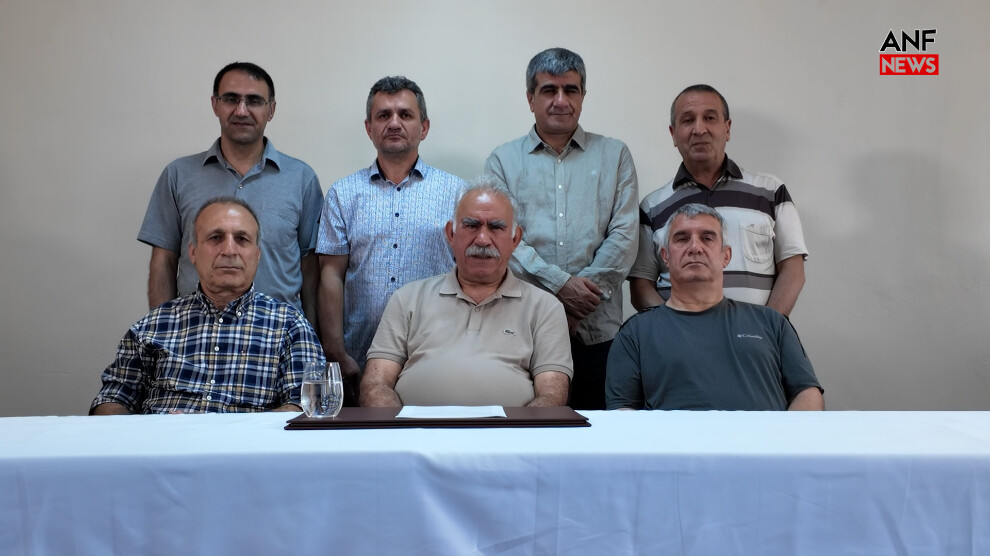After 27 years of imprisonment, PKK leader Abdullah Öcalan released a video message declaring the end of the organization’s armed struggle, abandoning the goal of an independent Kurdish state, and calling for a transition to democratic politics and peace.
Historical Declaration Marks New Chapter
In his first video message since his capture in 1999, Öcalan emphasized his support for the February 27, 2025 call for disarmament and the dissolution of the PKK. Speaking from İmralı Island prison, he described the 12th Congress of the PKK as providing “a correct and comprehensive response” to the peace initiative. The imprisoned leader stated that he had prepared a “democratic society manifesto” that should be considered a historic transformation, successfully replacing the 50-year-old “Kurdish Revolutionary Path” manifesto.
Öcalan revealed that all these changes resulted from negotiations conducted at İmralı prison, emphasizing that careful attention was paid to ensuring the talks were based on free will. He stressed that understanding and commitment to the principles of this new phase are essential conditions for continuing the process forward. The Kurdish leader acknowledged that this current situation should be accepted as a valuable and historic outcome, while recognizing that the efforts of comrades who played prominent roles deserve equal respect and importance.
The manifesto, according to Öcalan, carries historic social content not only for the Kurdish historical society but also for regional and global communities. He expressed confidence that this represents a successful example of the tradition of historic manifestos, marking a fundamental shift in the organization’s approach to the Kurdish question.
PKK Abandons Separatist Goals
The PKK leader made a definitive statement about the organization’s future, declaring that “we are ending the PKK’s struggle, which emerged as a reaction against the denial of Kurdish existence.” He explained that since recognition of the Kurdish people’s existence has now been achieved, the main objective has been accomplished. With the abandonment of the goal of establishing a separate nation-state, the PKK has also abandoned its fundamental strategy of armed struggle and “brought an end to its existence.”
Öcalan emphasized that politics does not tolerate vacuums, and this void must be filled with a program of “peace and democratic society,” using “democratic politics” as strategy and “universal rights” as the main tactic. He described their goal as a historic and decisive phase, calling for the voluntary laying down of arms and the establishment of a broad commission that could be legalized and empowered within the Turkish Parliament.
The Kurdish leader stressed that steps must be taken with caution and sensitivity, away from the logic of conflict and confrontation. He expressed confidence that their actions would not be futile, stating he could see the sincerity and had faith in the process. Öcalan noted that efforts toward more practical steps and clear solutions were prominently visible, indicating a genuine commitment to peaceful resolution.
He outlined that what was once considered repetitive and deadlocked would now continue with extensive criticism and evaluation. The transition represents a shift from what he termed “the phase of armed struggle” to “the phase of legal and democratic politics,” which should be viewed not as defeat but as a historic victory.
Transition to Democratic Politics
The Kurdish leader outlined key principles for the transition, stressing that all parties must fulfill their responsibilities to achieve “peace and democratic society” through honest integrationist guidance. He called for steps to be taken with caution and sensitivity, away from the logic of conflict and confrontation. Öcalan expressed confidence that their steps would not be in vain and emphasized the need for more practical actions.
Regarding disarmament, he stated that creating mechanisms for laying down weapons would advance the process, describing this as a voluntary step from the phase of armed struggle toward legal and democratic politics. He insisted this should be seen not as defeat but as a historic victory, with disarmament details to be determined and quickly implemented. The process should be conducted openly for relevant parties and public opinion, with mechanisms established to facilitate transparent disarmament.
The DEM Party and other parliamentary parties are expected to work together under the parliamentary umbrella to bring this process to success, fulfilling their responsibilities collectively. Öcalan emphasized that achieving the goal of “peace and democratic society” requires reaching honest integrationist guidance, marking a fundamental shift in approach.
Addressing his own freedom, Öcalan noted that he has never considered his personal liberation as an individual issue. From a philosophical perspective, he argued that individual freedom cannot exist apart from society, stating that “as much as the individual becomes free, society becomes free, and as much as society becomes free, the individual becomes free.” He insisted that conditions must be handled according to this principle.
The PKK leader concluded by expressing his belief in the power of politics and social peace rather than weapons, calling on others to practice this principle. He referenced recent developments in the region as clearly demonstrating the importance and necessity of this historic step. Öcalan welcomed criticism, suggestions, and cooperation regarding the process, expressing optimism about engaging in discussions that would lead to theoretical programs and strategic phases both regionally and globally.
He called for future efforts to be based on congressional decisions and the views presented in his message, urging determination in their efforts to achieve successful progress and transformation. The message, dated June 19, 2025, was signed with “eternal comradely greetings and love,” signaling what many consider a historic turning point in the decades-long conflict.


